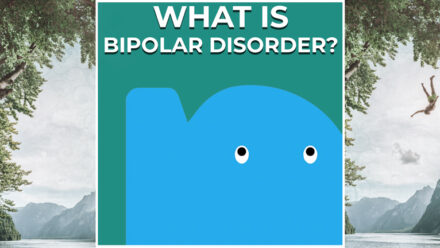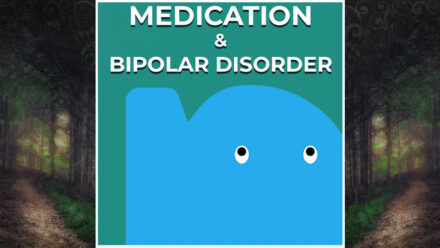
Luc was diagnosed with bipolar disorder when he was 20, after three years of slight ups and downs. He tried to accept it, without informing himself of this disorder and never spoke about it. He received medication, lithium, and took it regularly, but did not succeed in accepting his condition.
“I never felt happy in that period. Not knowing who I was, I never was at the right place. Only years later, I discovered that the lithium had left me emotionally flattened. It suppressed my negative emotions, but my positive ones just as much. It was like I was living on auto-pilot.
I had an old-fashioned psychiatrist who I saw once every three months: a blood test, a recipe, and three words of conversation
To the outside world, it seemed I was doing great. I completed my studies, had a nice girlfriend and a good job. And I was very active, even climbed the Kilimanjaro, travelled through Middle-America and Africa and studied for a year in El Salvador. But deeply inside I felt unhappy, and never expressed this to anyone.
I thought this was just who I was; something I had to live with. And what did I know? After all, my diagnosis came right after puberty (along with the accompanying medication), in a time when one is still trying to find his real identity.
After 13 or 14 years on lithium, I started to doubt my diagnosis
I went to a new psychiatrist for a check-up. He found it hard to judge what was right for me, but did help me in trying to get off my medication. Around that same time, my girlfriend and I broke up after eight years. I fell into depression. When this eventually brought me on antidepressants, I felt much better in short time. Actually a little too good: I became hypomanic, i.e. extremely euphoric, without even realising it.
My condition is a bipolar disorder type 2, which is less severe than the type 1. Depressive episodes, alternated with periods of hypomania: a soft form of mania. Characterized by feelings of euphoria, boundless behaviour and an exclusive focus on activities that bring joy.
I had the idea I was reborn. My friends however, three of which are psychiatrists themselves, noticed I wasn’t doing well. At their insistence, I quit my medication, which was the trigger for my hypomania.
After a reasonably stable period without meds, lasting about a year, I crashed again. I could not sleep, not even with sleeping pills. After a few sleepless nights in a row, I suddenly became very anxious and depressed.
’Late at night, I went to the crisis centre. ‘I’m not doing well’, I told them. ‘I think I have to be admitted.’
After two weeks in the hospital, they again diagnosed me as bipolar. For almost two years after, I was depressed, with a low point in early 2013. My new relationship had just ended, after 2,5 years, and I was currently living in the empty apartment of a friend. For days on end, I searched the internet to see what was wrong with me. I believed I was the most evil person on earth; a malicious narcissist, a psychopath. And along with that came thoughts of suicide.
Eventually, after a change in medication, this mood turned around completely: now I was feeling TOO good again…
My psychiatrist did not notice my happiness was actually too much, but I had also failed to tell him the whole story. I was hiding some parts from him, not to hide my illness (because I did not consider myself ill), but because I felt shame for some of the things I did. Again, I felt like I was born again. Looking back now, I realise I was hypomanic, but my psychiatrists declared me diagnose-free and in consultation with them, I stopped my medication.
I decided to cycle to Indonesia for a charity project. My departure would be in March 2014, after staying with my parents for a month. I thought it was the best idea ever, even though hardly anyone responded positively to my plans. And they had their reasons, like the fact that I had got myself into considerable debt. But I thought: “it will work out. I can write books about my trips and everyone will want to hire me, because that’s how great I am.”
But as soon as I moved in with my parents, I completely broke down. It was all getting too much for me and I went psychotic. I even thought I was a danger to others and turned myself in to the police. At first, they believed me and interrogated me, but of course they quickly noticed I had not committed any crimes, so they contacted my current psychiatrist.
Yet I did not trust him either: everyone was conspiring against me. I was given antipsychotics, but I thought they were tranquilizers so that the police could arrest me in my sleep. I accepted this fate and said farewell to my parents every night: “tomorrow I’ll be gone, taken off to jail”, I told them. My fears were overwhelming, but after a few days the medication kicked in and drove away my psychotic thoughts.
After this short psychosis, which lasted only several days, I lived with my parents for almost a year. My depression still lasted. At one day, psychiatrist Jim van Os approached me and asked if I wanted to write this story about recovery.
I thought: ‘what does recovery mean?, hardly believing such a thing was possible.
Nevertheless, I started writing for the Dutch version of Psychosisnet.com, and started doing small chores for the site. Once I was back in my home town Maastricht, I also started working with homeless teenagers. Many times we went bicycle racing together. That was really hard for me in the beginning, but cycling feels safe, as I am quite good at it.
For the Summer of 2015, I planned a bicycle tour from Maastricht to Madrid. The prospect made me very nervous, but I had to do something, I told myself. Because when you are depressed, everything feels worse. Your sense of direction, your awareness, your ability to judge people… My negative thoughts and fears sometimes also escalated into psychotic thoughts, so I asked my psychiatrist to increase my medication before I would leave for Madrid in June. In preparation for my tour, I went cycling through the Netherlands for a week. Then I realized it was going well, quite suddenly. I was no longer afraid to sit at a terrace by myself and even enjoyed it. Not a sign of negative thoughts or extreme fears.
That discovery was very nice of course, but also alarming, because my happiness can also get out of hand. And so I called my psychiatrist again. My medication was now slightly increased to manage my euphoria and keep my positive feelings in check. Quite a contrast, because only five days earlier I had for more medication against all the negativity. In any way, this increase helped and prevented me from losing myself into hypomania.
Since then, I am actually doing alright, for almost a year now. My doctors and friends regard me as stable now, which I haven’t heard in over twenty years. My medication is at a minimum, with only a low-dose mood stabilizer. For the first time in my life, after twenty years, I can say with full awareness: “There’s no denying I have an illness. I am bipolar.’
And that feels incredibly liberating.
Luc Vercauteren
Read more about Recovery:



Comments: